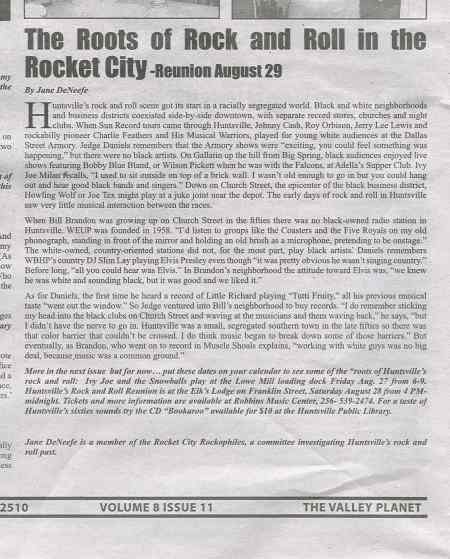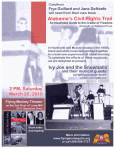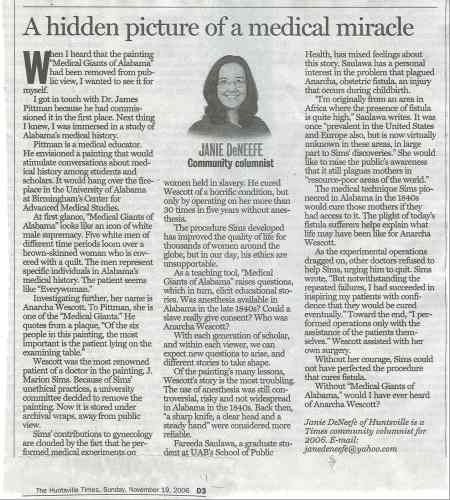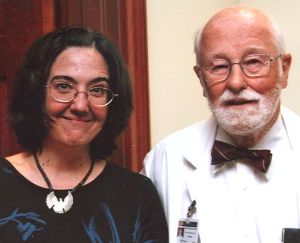Jane DeNeefe’s book Rocket City Rock and Soul: Huntsville Musicians Remember the 1960s (History Press, 2011) is now cataloged in the reading room of the Rock and Roll Hall of Fame!
http://catalog.rockhall.com/catalog/745980006

Rocket City Rock and Soul: Huntsville Musicians Remember the 1960s
June 10, 2013Tina Onassis’s Divorce, Alabama 1960 (radio story)
August 7, 2010Roots of Rock & Roll in the Rocket City
August 7, 2010civil rights book signing/ rock & roll show was a big hit
March 23, 2010Marengo County: Reclaiming the History
March 12, 2010Listen here:
WLRH podcast of
“Marengo County: Reclaiming the History,” adapted for audio from Alabama’s Civil Rights Trail: An Illustrated Guide to the Cradle of Freedom.
Photo/ Black Archives Building at A&M
February 20, 2010“Why is Alabama like it is?”
February 8, 2010Ivy Joe and the Snowballs Integrate Huntsville
February 6, 2010“Ivy Joe and the Snowballs Integrate Huntsville”
Everybody knows the 1960s were turbulent in Alabama. The general facts have been established: Huntsville managed to accomplish racial integration with less violence than Birmingham or Montgomery.
Back then, just like now, Huntsville’s business community was motivated by its special relationship to the federal government. To maintain our image as a forward-looking “space capital” or “rocket city” we really had no choice but to desegregate public facilities. Faced with local civil rights demonstrations, Police Chief Chris Spurlock did everything he could to keep Huntsville’s civic life civil.
Teenage musician Ivy Joe Milan also did his part to integrate Huntsville. As part of the first big wave of black students to attend Huntsville High School, he was looking for a way to shine.
So Ivy Joe was delighted when Tommy Graham, Chris Couchois, Billy Brown and Mike Byrum asked him to front their new band. Ivy Joe would sing, and the white guys would back him up.
Ivy Joe had always managed to find his own way. As an experienced “shoeshine boy” downtown, he was already an independent businessman. And he knew all the rock and soul classics.
So “Ivy Joe and the Snowballs” assumed their role in Huntsville’s social history. They played for white kids at the country club. They played black social clubs, a white country and western bar, high school dances and family barbecues. They played at teenage dance clubs like the Epic on Andrew Jackson Way, and television’s “Hullabaloo.”
Effective social change rarely occurs by administrative decree. Social change starts with individual acts of courage. As teenage musicians, “Ivy Joe and His Snowballs” helped Huntsville integrate peacefully.
Ivy Joe recalls, “It was all going fine until the night Martin Luther King got shot. That night, the people outside the Night Life Club on Holmes were so frustrated.
Some of them just turned on the Snowballs, just for being white. Ernest Jones and I just barely got the guys into the car and out of there! Then I got kicked out of Huntsville High for socializing with white girls in the corridors.”
When he says that, my sense of injustice flares, and I demand a better explanation.
But Ivy Joe says “Now, hold it!” He smiles at me, his dreadlocks animated. Then he explains, “I’m a historic figure. I’ve got to save some stories for my book!”
















